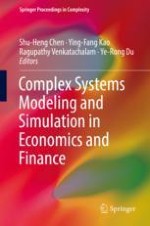2018 | OriginalPaper | Buchkapitel
Heterogeneity, Price Discovery and Inequality in an Agent-Based Scarf Economy
verfasst von : Shu-Heng Chen, Bin-Tzong Chie, Ying-Fang Kao, Wolfgang Magerl, Ragupathy Venkatachalam
Erschienen in: Complex Systems Modeling and Simulation in Economics and Finance
Aktivieren Sie unsere intelligente Suche, um passende Fachinhalte oder Patente zu finden.
Wählen Sie Textabschnitte aus um mit Künstlicher Intelligenz passenden Patente zu finden. powered by
Markieren Sie Textabschnitte, um KI-gestützt weitere passende Inhalte zu finden. powered by
